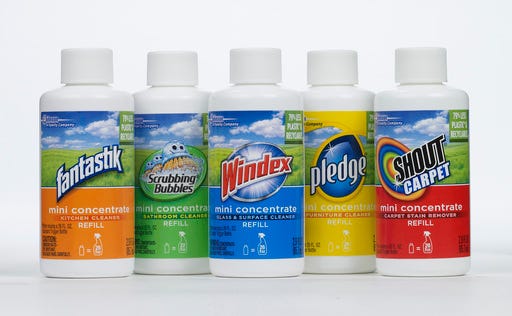In a move to offer consumers a green choice, SC Johnson has expanded its Mini line of concentrated cleaners that can be used in refillable bottles.
February 28, 2012
In a move to offer consumers a green choice, SC Johnson has expanded its Mini line of concentrated cleaners that can be used in refillable bottles.
 The line now includes its Fantastik, Pledge, Scrubbing Bubbles, Shout, and Windex brands. The expansion builds on SC Johnson's Windex Mini concentrated refill pilot, launched in July 2011, which aimed to engage consumers about concentrated refills.
The line now includes its Fantastik, Pledge, Scrubbing Bubbles, Shout, and Windex brands. The expansion builds on SC Johnson's Windex Mini concentrated refill pilot, launched in July 2011, which aimed to engage consumers about concentrated refills.
As of now, the concentrated refills are only available at www.scjgreenchoices.com. The company's goal is to create enough consumer demand for concentrated refills to earn them a spot on store shelves right next to pre-mixed products.
A SC Johnson spokesperson told PlasticsToday that a concentrated refill can save 70-80% of the plastic that would be needed to make a new trigger bottle.
"So refilling with a concentrate is a very small behavior change that could make a real difference in minimizing waste," the spokesperson said. "That's what we want to do - we want to help people understand environmental tradeoffs, and give them product options that, we hope, will help them make the best choice for their family and the planet."
The expanded line of concentrated refills comes in smaller bottles made of the same recyclable high-density polyethylene as a milk jug, according to the news release. Consumers combine one bottle of concentrate with regular tap water in a reusable trigger bottle. The refill bottle can be recycled in most community recycling programs.
If just 20% of the 320 million cleaning products sold in trigger bottles were refilled each year, it could avoid using 3.5 million pounds of virgin plastic and avoid transporting nearly 11.5 million gallons of water, which is about 17 Olympic-size swimming pools' worth, the company stated.
SC Johnson has sold refills in other markets for years, the spokesperson said. However, refills are a tougher sell in the U.S. market, as many consumers in the U.S. view refilling a bottle as an inconvenience.
"They worry about spilling and they worry about having to get the mix right," the spokesperson said. "We've actually done a lot of work to make those very easy, and to make our formulas work with any type of tap water. But it's a challenge to change consumers' mindsets."
Another challenge for refillables is a perception of cost. Many U.S. consumers anticipate a concentrated refill to be much less expensive than a starter product, the spokesperson said.
"But the reality is that the product has the same basic formula, without the water, as well as production, marketing and logistics costs," the spokesperson said. "So while there's a significant improvement in the environmental cost, there isn't always that financial cost adjustment that consumers seem to expect."
Getting concentrates to be accepted is about education, and helping people understand the benefits and the realities, the spokesperson said. To get a measure of consumer behavior, SC Johnson gathered consumer input received online and from focus groups during its initial Windex Mini pilot.
SC Johnson believes that with the right products, consumers will consider the change.
"We know people want to do this," the spokesperson said. "We did some research with GfK Roper this past year and found that 75% of American consumers say they feel good when they take steps to help the environment. So we want to help them do that."
About the Author(s)
You May Also Like


